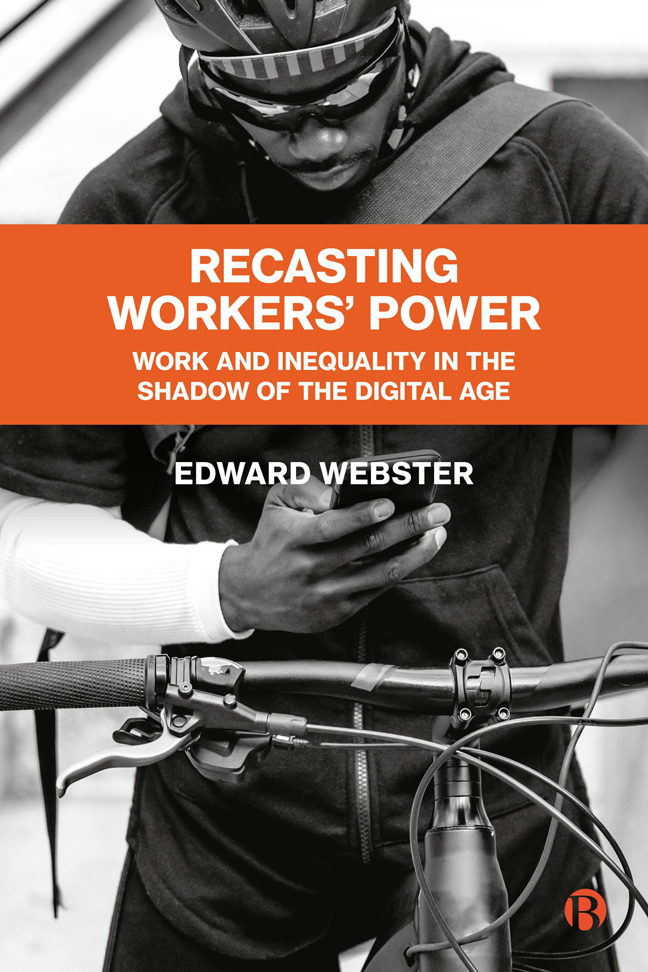Book contents
- Frontmatter
- Contents
- List of Figures and Tables
- List of Abbreviations
- Preface
- 1 The End of Labour? Rethinking the Labour Question in the Digital Age
- 2 Precarious Work after Apartheid: Experimenting with Alternative Forms of Representation in the Informal Sector
- 3 Neo-liberalism Comes to Johannesburg: Changing the Rules of the Game
- 4 Divided Workers, Divided Struggles: Entrenching Dualisation and the Struggle for Equalisation in South Africa's Manufacturing Sector
- 5 Authoritarian Algorithmic Management: The Double-edged Sword of the Gig Economies
- 6 Crossing the Divide: Informal Workers and Trade Unions
- 7 Global Capital, Global Labour: The Possibilities of Transnational Activism
- 8 Changing Sources of Power and the Future of Southern Labour
- Index
Preface
Published online by Cambridge University Press: 23 January 2024
- Frontmatter
- Contents
- List of Figures and Tables
- List of Abbreviations
- Preface
- 1 The End of Labour? Rethinking the Labour Question in the Digital Age
- 2 Precarious Work after Apartheid: Experimenting with Alternative Forms of Representation in the Informal Sector
- 3 Neo-liberalism Comes to Johannesburg: Changing the Rules of the Game
- 4 Divided Workers, Divided Struggles: Entrenching Dualisation and the Struggle for Equalisation in South Africa's Manufacturing Sector
- 5 Authoritarian Algorithmic Management: The Double-edged Sword of the Gig Economies
- 6 Crossing the Divide: Informal Workers and Trade Unions
- 7 Global Capital, Global Labour: The Possibilities of Transnational Activism
- 8 Changing Sources of Power and the Future of Southern Labour
- Index
Summary
There is a widespread view that labour as a counter-hegemonic force has come to an end. We saw this in the work of Manuel Castells (1996) and his notion of the network society, then Guy Standing's (2011) notion of the global precariat, and now Klaus Schwab's (2016) idea of a ‘Fourth Industrial Revolution’ (4IR). There is a lot going for these arguments; there is no question that there has been a decline of union membership and density in the Global North, although in some countries more than others. For example, in liberal market economies such as Australia union membership has declined from 50 per cent to 15 per cent, and in the United States from 20 per cent to 11 per cent. In coordinated market economies such as Germany it has declined from 35 per cent to 18 per cent. Even a social democratic country such as Sweden has lost union members, from 78 per cent to 68 per cent (Visser, 2019: 15).
But the problem with the pessimistic ‘end of labour thesis’ is that it reifies globalisation and the digital age, giving them a logic and coherence that they do not have. It adopts a form of linear analysis that takes little account of historic structural shifts and cycles, or what Karl Polanyi (1944) called the double movement, and what Marx saw as the relentless drive of capital to accumulate by exploiting labour and thereby generating ongoing struggles against it (Marx, 1990).
Most importantly, the pessimists present workers as victims. The result is that labour can only act defensively – fight militantly to defend a demand, even when it is unrealistic. The result is that labour is seen as an actor without agency that cannot think of alternatives or imagine a future towards which labour can work. We need to rethink the way we view digitalisation, and reject a preconceived notion about the development of globalisation.
An important event in this rethinking was a global project on innovation in trade unions, Trade Unions in Transformation (TUiT), initiated by the Friedrich Ebert Stiftung (FES), with a focus on power resources (Herberg, 2018).The studies that form part of the TUiT project restore a focus on worker agency and demonstrate how workers are responding innovatively to globalisation.
- Type
- Chapter
- Information
- Recasting Workers' PowerWork and Inequality in the Shadow of the Digital Age, pp. ix - xivPublisher: Bristol University PressPrint publication year: 2023



